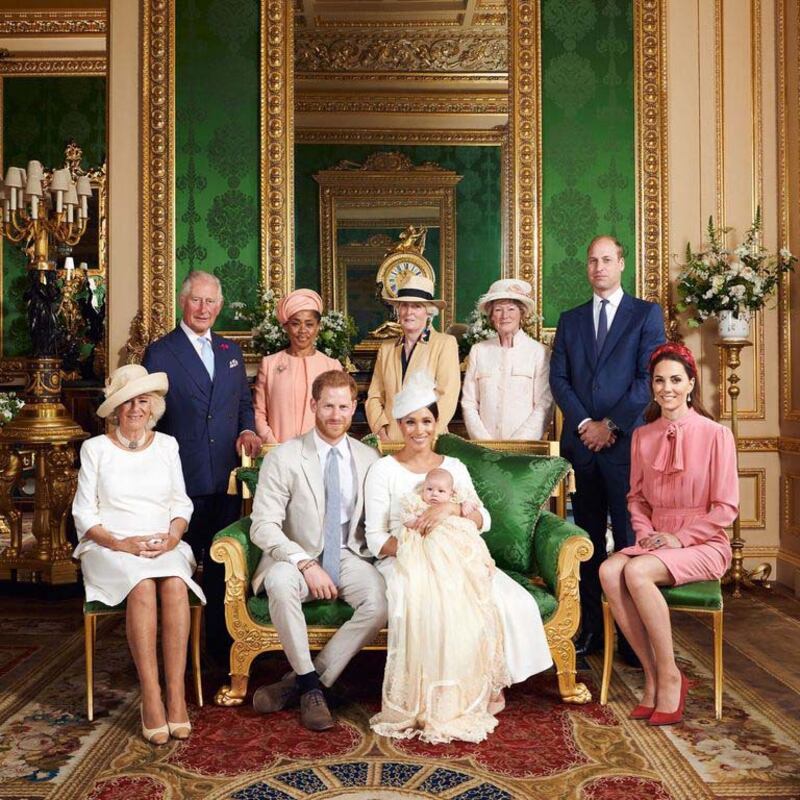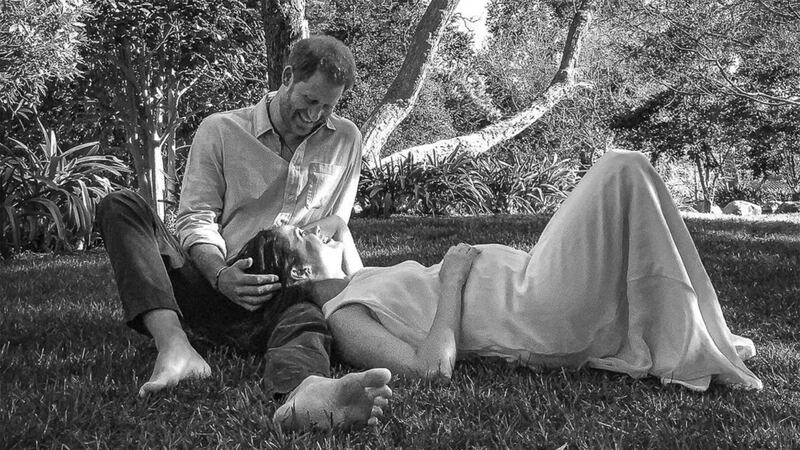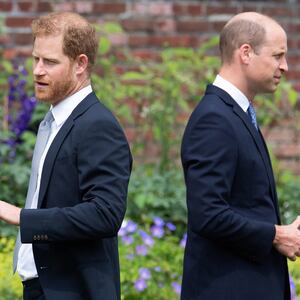Christenings are the most simple, joyous of ceremonies. Funerals aren’t (usually) much fun and weddings, as the royals know only too well, often come with a substantial side-serving of emotional disturbance.
But what family could be so dysfunctional as to have a massive, public argument about a christening?
Why, the British royal family, of course.
The Sussexes have been left dismayed after one of Britain’s best-informed royal reporters, Camilla Tominey, reported in the Daily Telegraph this week, apparently on the basis of a backroom briefing by the palace, that Harry and Meghan’s new baby Lilibet would not be christened in England.
She said that a “palace source” had told her: “There will not be a christening in the U.K. It is not happening,” with a second source suggesting it was “highly unlikely” baby Lilibet would be christened at Windsor as her brother was.
This was clearly news to the Sussexes, who swiftly issued a statement of their own saying, “Plans for the baby’s christening have not been finalized and as such, any assumptions about what will or will not take place are mere speculation.”
A source told The Daily Beast that, as far as Harry and Meghan were concerned, there was “no truth” to the Telegraph report.
Once again, the Sussexes and the Windsors are back in the trenches, each with their own very different versions of reality.
As the author of the most shocking royal biography of all time, Diana: Her True Story, which gave the public a ringside seat at the War of the Waleses, and now chronicling the life of Meghan Markle, in his newly updated biography, Meghan, a Hollywood Princess, the writer Andrew Morton has pathologized royal dysfunction more systematically than, arguably, anyone else on the planet.
So what does he make of this latest outbreak of royal combat-by-media?
“There are certain practical matters, of course, to do with diaries, the queen’s plans for Christmas at Sandringham, COVID vaccination and bringing children from LA to London,” Morton told The Daily Beast. “But as well as all those factors there is also clearly a lack of communication between the two parties, brought about by distance and by what has happened over the past year.
“There is a basic lack of trust on both sides. This was first made manifest in the decoupling, where Prince Harry was reluctant to put down his thoughts on the future in a memo because he feared it would be leaked to the media—and lo and behold it was! That generated the ill-feeling which ultimately led to the situation where he and Meghan issued their own statement, giving the queen just 10 minutes’ notice they were going to do so.
“So it would be naïve to say there wasn’t already an absence of trust between the various parties.”
The tick-tock leading up to this mess goes back to the weeks after Lilibet’s birth, when it was reported in various outlets that the couple wanted the child to be baptized in England, with full royal honors, in the chapel at Windsor where they were married, with the queen present.
Richard Eden, the well-briefed and usually reliable social “diary” editor for the Daily Mail quoted a source telling him, when Harry returned home for the unveiling of a statue in memory of his mother on July 1: “Harry told several people that they want to have Lili christened at Windsor, just like her brother.”
Over the summer, the issue was batted around occasionally in public debate.
Harry and Meghan’s supporters saw their willingness to baptize the baby in England, with her great grandmother on hand, as a sign of their openness to reconciliation with the family. Their opponents were more likely to view it as a cheeky attempt by the Sussexes to re-associate themselves and their child with the royal brand on which their fame and wealth is based, despite having savagely criticized them and accused an unnamed family member of racism on their Oprah interview.
The royals, and the Sussexes, officially at least, said nothing.

A family portrait during Archie's christening.
Chris Allerton / Sussex RoyalIn September, the first hint that the palace wasn’t keen came when showbiz journalist Neil Sean said the plan to christen Lilibet in Windsor had come to a “grinding halt” because of objections by William: “There was one person who basically decided there wasn’t an appetite for this, and the person that seemingly is, so far, not willing to kiss and make up is his brother.”
Arguably, not enough attention was paid to Sean’s report—but it set the stage for the bizarre showdown-by-media that happened this week.
The report in the Telegraph clearly blindsided the Sussexes.
To seasoned observers of royal intrigue, however, the anonymous briefing was typical of a sneakiness that often characterizes disputes between royal households, leaving credible “sources” in the royal establishment to do the dirty work of torpedoing an idea that the other household still thinks is a work in progress, via the pages of the broadsheets.
Of course, this is exactly the kind of media dark op that Harry and Meghan complained about in their interviews with Oprah; mysterious stories appearing in the papers that Meghan had made Kate cry when in fact, Meghan claims, it was Kate who brought her to tears.
Given the palace’s alleged record on dealing with Harry and Meghan as second-class citizens, no one should be that surprised that they had apparently neglected to inform California of the royal view on a christening in Windsor.
California may insist all they like that they have not made up their mind but one interpretation of the message from London might be: your child may technically be a lineal heir to the throne, but it will never be treated as such.
Morton said the current impasse, in which the palace say one thing and Harry and Meghan say the opposite, recalls the controversy over the naming of Lilibet. “Johnny Dymond of the BBC said very clearly that the queen had not been approached about using the name. The Sussexes said she had been and that to say otherwise was false and defamatory.”
The optics of the controversy over the name and this controversy are similar and important, he says: “The Sussexes are keen on presenting an image of being in lock step with the queen—if not anyone else—and are quick to issue threats to those who suggest otherwise.
“The naming of the child Lilibet and Diana shows they were not trying to start a revolution. They have, as we have seen over the past few months, trodden very carefully about anything to do with Her Majesty.”
Critics say the couple want to have their cake and eat it, and that it is a fallacy to say they are attacking the “institution” of monarchy and not the queen, who heads it up.
Of course, it is well within the abilities of Meghan and Harry to organize their own christening at any number of splendid churches in the U.K. But they would not be able to use the chapel at Windsor Castle—where Archie was christened—without the queen’s permission.
To be publicly exposed as having been denied the use of it would be yet another humiliation at the hands of the palace that they would be unlikely to opt in to.

Meghan and Harry's official pregnancy announcement photo for Lilibet, released on Valentine's Day 2021.
Misan Harriman/The Duke and Duchess of SussexThe palace literally holds the keys here, and for that reason the palace’s apparent briefing that no British christening will take place is carrying rather more weight with seasoned observers of the royals in terms of what will actually happen than the Sussex’s insistence that they are still deciding.
Morton says: “It shows how tentative the trust is between the two sides. There is a profound lack of trust. They can’t agree on the name, they can’t agree on the christening; it doesn’t take a genius to see that bridges have been burned.”
Does Morton think that generally things are getting better or worse between the rival courts of California and Windsor?
“Harry said he wanted some time and space and he has got it. There is a wish-fulfillment fantasy in the mass media that they will all get back together and be lovey-dovey—but life doesn’t work like that.”
Instead, what we are left with this weekend is silence. Silence from the palace, and silence from Montecito—both of whom declined to respond to The Daily Beast’s requests for comment.
However, it is a silence that is rather eloquent. Harry and Meghan could break it by letting it be known they plan to christen their child in America, with Michael Curry, the head of the Episcopal church, presiding.
But that would be to give up on their dream of Lilibet getting the same royal treatment her brother and cousins were all unquestioningly given. That surrender seems a way off still.
This disagreement over the basic facts of the location of the christening will ultimately be borne out by events, one way or other. In the meantime the argument is a vivid representation in microcosm of the deeply troubled relationship between the Californian and British branches of the royal family.







